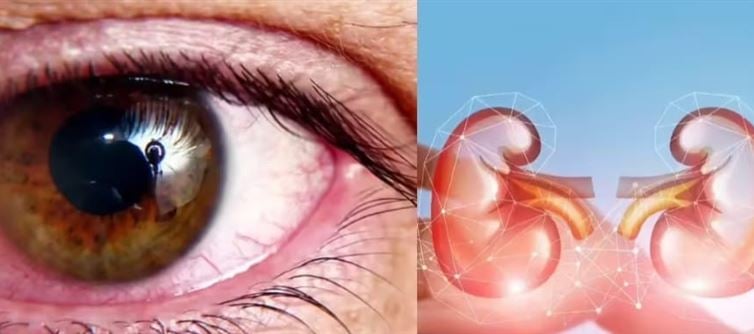
The eyes can reveal early signs of kidney problems before kidney damage becomes severe.
Both kidneys and eyes depend on delicate blood vessels and proper fluid balance.
When kidney function declines, changes often appear in the eyes because blood vessels and fluid regulation are affected.
Why the Eyes Reflect Kidney Health
Kidneys filter waste and regulate minerals and fluids; an imbalance impacts eye tissues.
The eyes rely on extremely small blood vessels. Any vascular damage caused by kidney disease influences:
Retinal circulation
Eye moisture
Pressure inside the eyes
Optic nerve health
Color perception
Common Misconception
Most people associate kidney disease only with:
Fatigue
Swelling in the legs
Change in urination
However, early symptoms can be visible in the eyes long before these signs appear.
Five Eye Symptoms That May Indicate Kidney Problems
1. Persistent Puffy Eyes
Swelling around the eyes that lasts all day can indicate protein leakage from the kidneys.
If puffiness appears with frothy or foamy urine, consult a doctor immediately.
2. Blurred or Double Vision
Sudden vision changes may signal damage to retinal blood vessels.
High blood pressure and diabetes — major kidney disease causes — also injure the retina.
May lead to retinal swelling and, if untreated, permanent vision loss.
3. Dryness, Burning, or Roughness
Frequent dryness, irritation, or burning without a clear cause can occur in:
Advanced kidney disease
Patients on dialysis
An imbalance of calcium and phosphorus reduces tear production and increases redness.
When to Seek Medical Evaluation
If eye symptoms occur along with fatigue, body swelling, or high blood pressure/diabetes:
Get both eye and kidney function tests promptly.
Disclaimer:
The information contained in this article is for general informational purposes only. While we strive to ensure accuracy, we make no warranties or representations of any kind, express or implied, about the completeness, accuracy, reliability, suitability, or availability of the content. Any reliance you place on the information is strictly at your own risk. The views, opinions, or claims expressed in this article are those of the author and do not necessarily reflect the official policy or position of any organization mentioned. We disclaim any liability for any loss or damage arising directly or indirectly from the use of this article.




 click and follow Indiaherald WhatsApp channel
click and follow Indiaherald WhatsApp channel